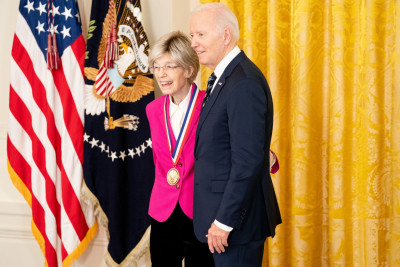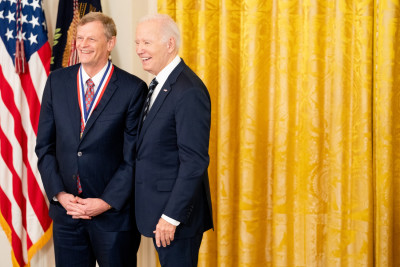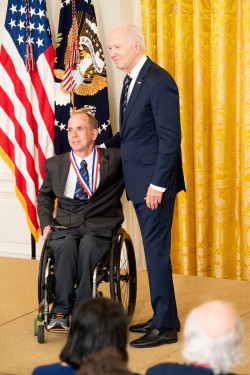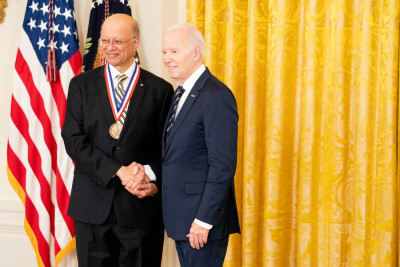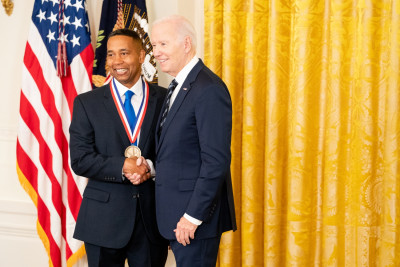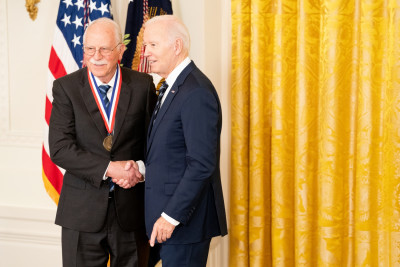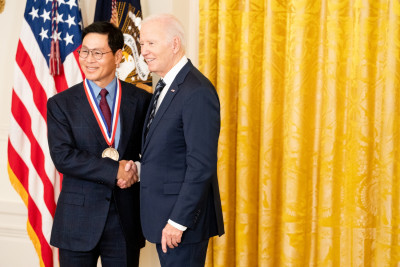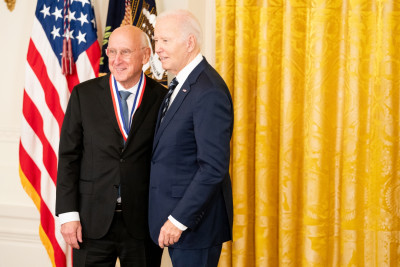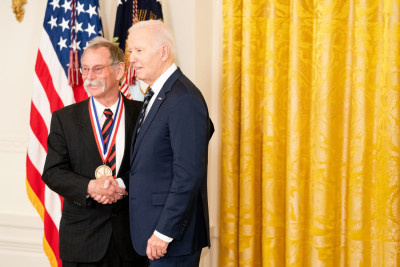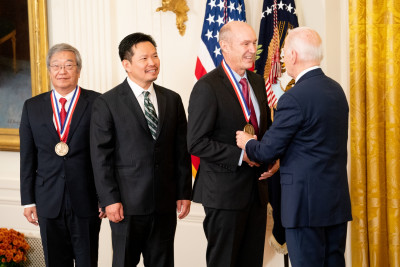The National Medal of Technology and Innovation (NMTI) is the nation’s highest honor for technological achievement, bestowed by the president of the United States to America's leading innovators.
There were 12 laureates in the 2022 class: Mary-Dell Chilton; John M. Cioffi; Rory A. Cooper; Ashok Gadgil; Juan E. Gilbert; Charles W. Hull; Jeong H. Kim; Steven A. Rosenberg; Neil Gilbert Siegel; and James G. Fujimoto, David Huang, and Eric Swanson.
Mary-Dell Chilton
Mary-Dell Chilton
Syngenta Biotechnology, Inc.
For laying the foundation of modern plant biotechnology. Her breakthrough success developing the first genetically modified plant has led to the engineering of crops that can withstand insects, disease, extreme weather, and climate change, transforming agriculture, protecting the planet, and improving the health of people around the world.
John M. Cioffi
John M. Cioffi
Stanford University, ASSIA, Inc.
For advancements that helped bring high-speed internet to the world. The digital subscriber line that he helped invent ignited the growth of the digital age, vastly increasing people’s access to information, reshaping the global economy, and transforming how we work, communicate, and find community.
Rory A. Cooper
Rory A. Cooper
University of Pittsburgh, U.S. Department of Veterans Affairs
For empowering the lives of millions of Americans. By inventing and developing cutting-edge wheelchair technologies and mobility devices, cultivating the next generation of rehabilitation engineers, and championing wounded veterans and students with disabilities, he moves us closer to being a Nation that is accessible for all.
Ashok Gadgil
Ashok Gadgil
University of California, Berkeley, Lawrence Berkeley National Laboratory
For providing life-sustaining resources to communities around the world. His innovative, inexpensive technologies help meet profound needs, from drinking water to fuel-efficient cookstoves. His work is inspired by a belief in the dignity of all people and in our power to solve the great challenges of our time.
Juan E. Gilbert
Juan E. Gilbert
University of Florida
For protecting democracy. His pioneering designs in elections technology aim to make voting more secure and accessible, helping ensure ours remains a government of, by, and for the people. An advocate for diversity in computer science, he makes this discipline stronger and more representative of our nation.
Charles W. Hull
Charles W. Hull
3D Systems
For helping launch the groundbreaking 3D printing industry. Thanks to stereolithography, which he invented, countless products can be prototyped faster and cheaper, reshaping industries from aerospace to health care to education. He continues to drive innovation in advanced manufacturing critical to our nation’s economy, security, and global leadership.
Jeong H. Kim
Jeong H. Kim
Kiswe Mobile, Inc.
For advances in engineering and technology that transformed how we communicate. His work on broadband optical systems, data communications, and wireless technologies have made communication faster and clearer, including improvements in battlefield communications that strengthen our national security. He exemplifies the power of American entrepreneurship and innovation.
Steven A. Rosenberg
Steven A. Rosenberg
National Cancer Institute
For transforming the way we treat cancer and advancing our progress toward ending cancer as we know it. By leading the development of the first effective immunotherapies, he has saved countless lives and inspired a generation of scientists. His work powerfully illustrates that we can do big things as Americans.
Neil Gilbert Siegel
Neil Gilbert Siegel
University of Southern California
For technology that bolstered our nation’s security, economy, and connectivity. His creation of the “digital battlefield” represented a new approach to combat operations, integrating secure communications and precise, real-time data to minimize U.S. casualties and protect allies and civilians. Today, technologies he invented are found in smartphones everywhere.
James G. Fujimoto, David Huang, and Eric Swanson
Team: James G. Fujimoto, David Huang, and Eric Swanson
Massachusetts Institute of Technology, Oregon Health & Science University
For enhancing human vision. Their invention of optical coherence tomography transformed ophthalmology by providing a detailed image of the retina for the first time. Their work is now the standard of care for the detection and treatment of eye disease, giving millions a new chance to see the world.


